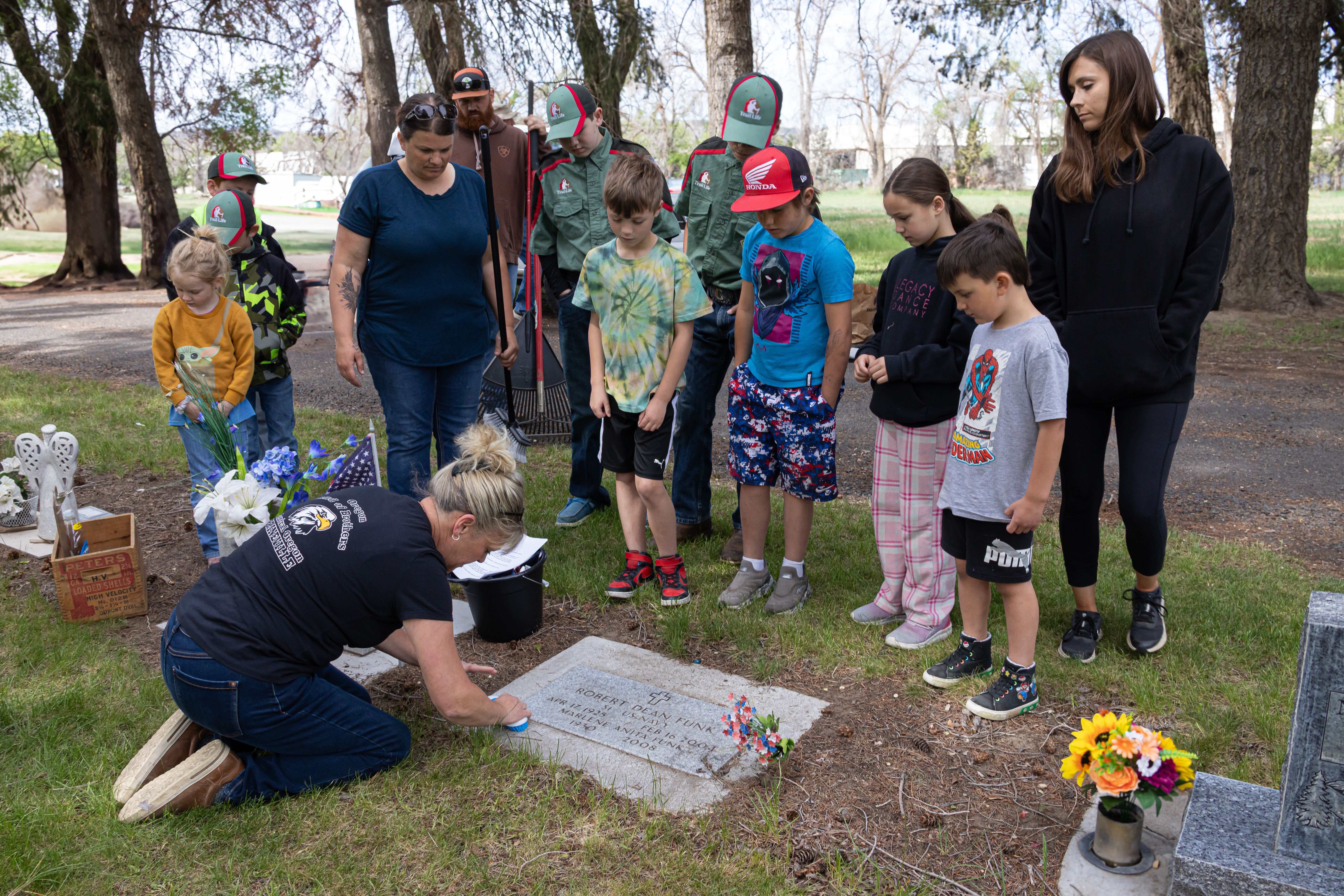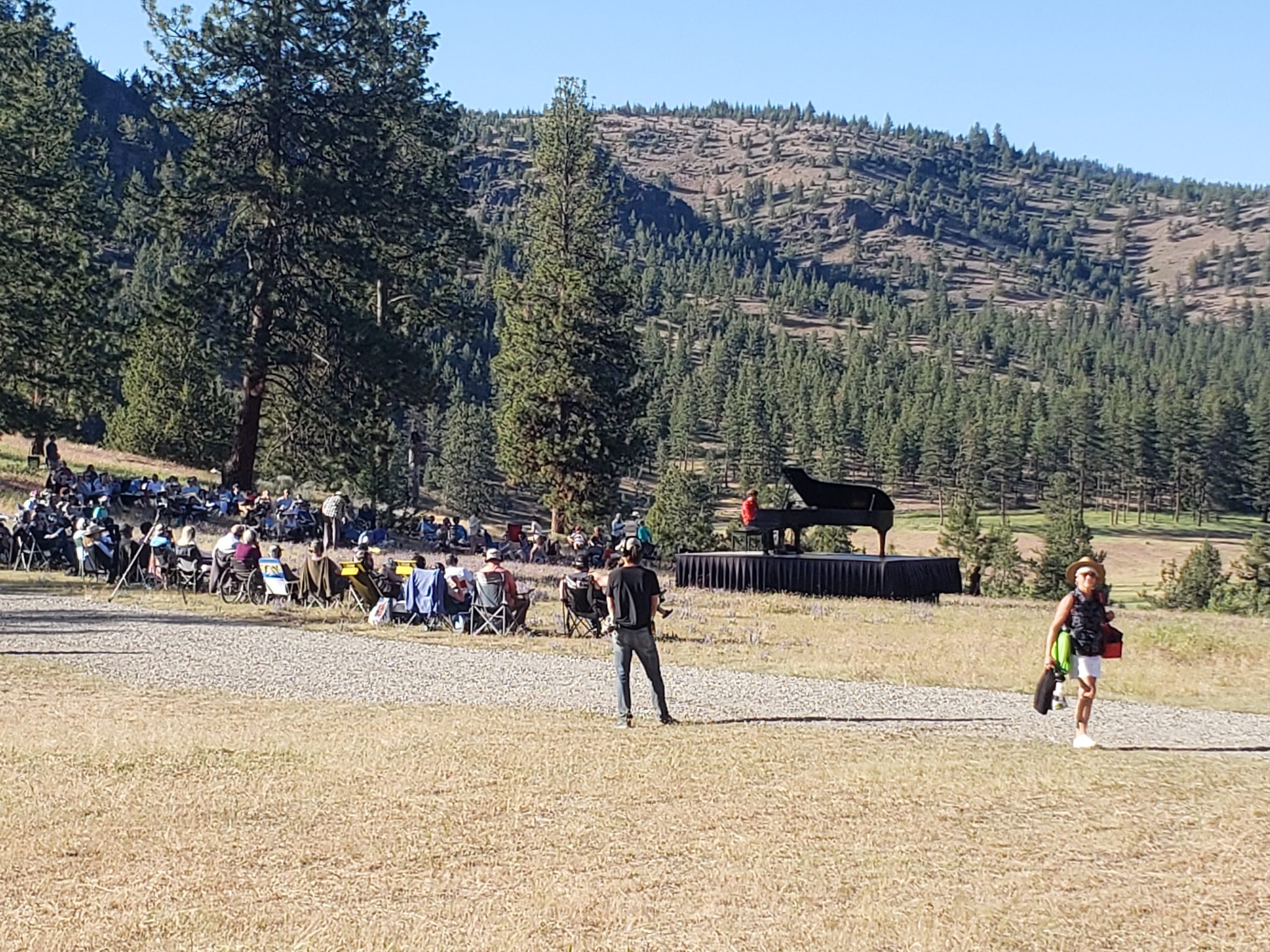UGB expansion and biomass can wait: Prineville City Council tables vote after hearing
Published 4:32 pm Wednesday, May 14, 2025

- Residents line up to speak to the council during the hearing. (Jason Chaney/Central Oregonian)
Prineville city councilors tabled two ordinances related to an urban growth boundary expansion and pursuit of a biomass project following a public hearing Tuesday evening.
The May 13 meeting, which was moved from Prineville City Hall to the Barnes Butte Elementary gymnasium, was dominated by the continuation of a public hearing on two controversial ordinances.
The city is trying to expand the urban growth boundary (UGB) amidst an update to two chapters of its comprehensive plan, one of which relates to zoning and another to economy. Local leaders hired ECOnorthwest and 3J Consulting to prepare an economic opportunities analysis (EOA) and UGB expansion report. The purpose of this contract, according to a city staff report, was to update the city’s current EOA that was conducted in 2002 and expand the UGB for a biomass project.
That EOA found that while the city has more than enough land to satisfy commercial and light industrial needs for the next 20 years, they lacked enough land for anticipated heavy industrial needs during that same timeframe. The city has seven heavy industrial sites of 50 acres or larger, but the EOA determined nine is needed.
The city opted to expand the UGB where part of its border follows Lamonta Road. The UGB follows a portion of the road, just northwest of Ritches Lane, and that portion of the border would get expanded north to take in four properties amounting to 227 acres.
A public hearing was held at the city council’s April 8 regular meeting, but testimony was cut short due to a lack of a quorum toward the end of the session. The record was kept open to allow citizens to submit written testimony and a continuation of the public hearing was scheduled. At least 300 people attended the May 13 meeting.
City report on UGB expansion and biomass project
City staff first gave a report on the proposed UGB expansion and potential biomass plant, joined by Rob Broberg of TRM Development Solutions, who is interested in siting a biomass plant in Prineville. During the report, Caroline Ervin, the city’s director of strategy and economic development, highlighted several benefits of the proposed project. These included wildfire risk reduction, water quality and quantity improvement through the use of juniper as biomass fuel, power generation and economic development through temporary plant construction jobs and permanent jobs at the completed facility.
“The project would create a local market for waste material, low value species and residuals to promote forest health improvements,” she said. “Ideally, a good portion of the material for this project would come from Ochoco National Forest and Crooked River National Grassland.”
Ervin went on to note that the plant would utilize advanced technologies that would “scrub the air of PM 2.5 particulate matter,” which is known to cause various health problems, reducing 99% of such particulates.
This claim was later reinforced by Broberg, who noted that he has gone back and forth with air scientists to prove that the plant’s technology can meet the threshold for what Clean Air Oregon establishes as a safe project.
City Planning Director Josh Smith spoke to the UGB expansion and its role in the potential biomass project. He explained that while the expansion would open the door to rezone the exclusive farm use (EFU) property to heavy industrial and allow siting of a biomass facility, that cannot happen unless the city annexes the property.
“It stays in the county until it is annexed,” he said. “That’s when somebody can apply for a biomass facility. That’s when you see the site plans, when you see the form and function of the site, that’s when you apply your development standards, buffering and screening. This is the stage when you do full studies.”
An applicant would also have to go through the county land use process, Smith continued, and then the state approval process for permits from the Department of Environmental Quality (DEQ) and others.
Public testimony is mixed
The city council heard roughly three hours of testimony from community members during the hearing. While there were more statements in opposition to the UGB expansion and biomass facility, several people spoke in favor of the proposals.
“I think the expansion is a terrible idea,” Julie Thompson said, pointing out traffic and water usage concerns in particular. “This location shouldn’t even be rezoned heavy industrial because the people who live in that area moved there for farmland use and the lifestyle.”
Ken Smith criticized the lack of communication about the city’s plans prior to pursuing the UGB expansion and biomass plant.
“It’s too bad you folks couldn’t have taken a little more time to let us know about what was going on here,” he said.
Smith went on to dispute claims about the biomass plant reducing the risk of wildfire, saying that any belief of that nature is “dead wrong.”
“We are still going to have forest fire smoke,” he said.
Tim Deboodt, who spoke in favor of the city’s proposals, agreed that operating a biomass plant won’t rid the forest of all fuels and stop wildfires entirely.
“You may not stop 50% of wildfires, you may not stop 70% of wildfires, but you are going to stop some,” he said. “We are not going to get rid of that, but we need to start making dents, and projects like this make dents.”
John Shelk, managing director of Ochoco Lumber Company, who also spoke in favor of the proposals, addressed emission concerns. He detailed the local mill industry’s history and how emission standards have tightened to such an extent that none of the mills operating in the past could operate today.
“The proposal … responds to a real need for additional (power) generating capacity in our region,” Shelk continued. “Biomass is the next opportunity that we as a community … face.”
City council response and decision
After taking testimony, councilors spoke favorably about bringing biomass to Prineville, citing many of the benefits Ervin and Broberg highlighted earlier in the meeting.
“This is an opportunity for Prineville to make a proactive move to create local renewable energy to ensure that we can meet our rising energy demands in the future,” said Councilor Shane Howard.
However, the councilors were not in agreement on the city moving forward with proposed location of the UGB expansion and siting of the biomass plant. Howard expressed his full support of the location and cited Prineville’s history to back his conclusion.
“The hard truth about this is that this proposal is not unprecedented in Prineville. At one point, everything that is in incorporated Prineville was farm land. We have a rich tradition of strategic expansion to facilitate growth.”
Howard went on to push back against some of the claims made by project opponents.
“I have seen a lot of bad information circulating about this sensitive subject,” he said. “How can people think that this facility would be such an environmental pollutant? We live in one of the most environmentally protective states in the nation.”
Councilor Steve Uffelman, by contrast, said that he is “not convinced that the site selection is the most optimum for us moving forward.”
Mayor Jason Beebe echoed his view, stating that it is his belief “that the property being considered for UGB expansion is not the best location for a biomass plant.”
Consequently, Uffelman moved to table the vote on the two ordinances related to the issue, to not only allow more time to explore alternative sites and thoroughly vet the issues raised by the public but do so with broader community involvement.
The motion passed by a 4-2 margin, with Howard and Councilor Marv Sumner voting against it.





